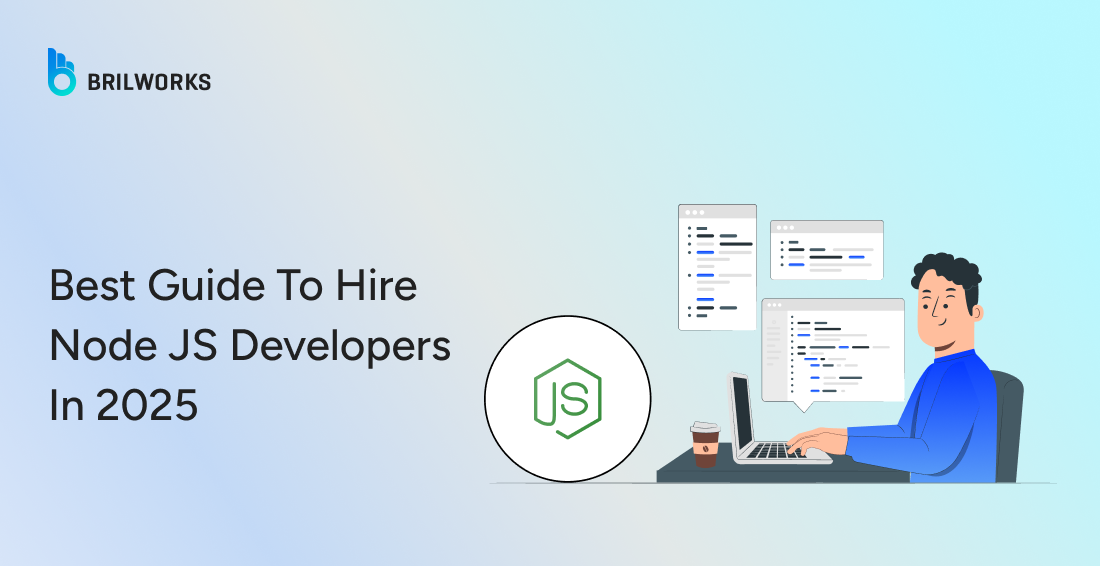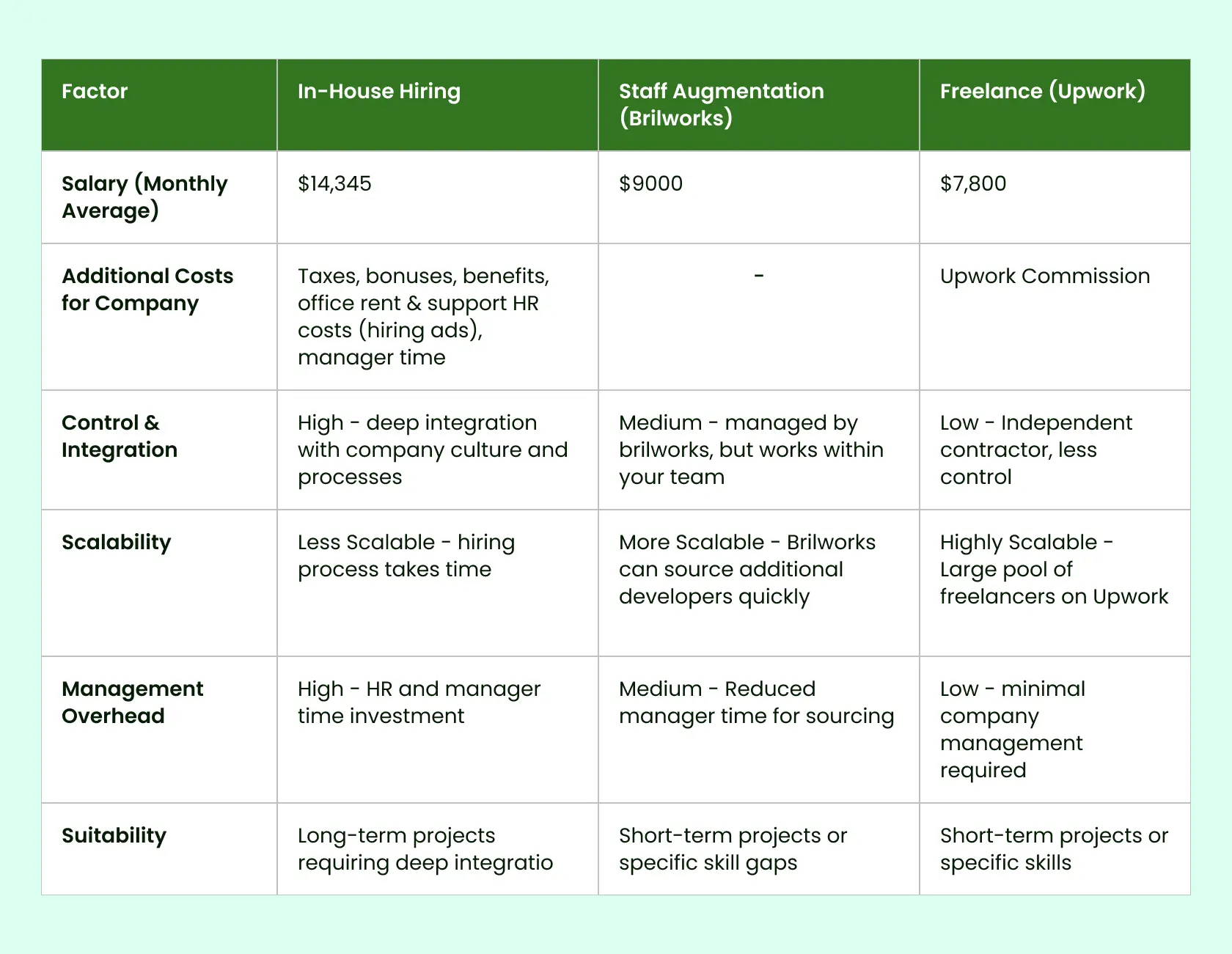COOPERATION MODEL
ARTIFICIAL INTELLIGENCE
PRODUCT ENGINEERING
DevOps & Cloud
LOW-CODE/NO-CODE DEVELOPMENT
INDUSTRY
FRONTEND DEVELOPMENT
CLOUD DEVELOPMENT
MOBILE APP DEVELOPMENT
LOW CODE/ NO CODE DEVELOPMENT
EMERGING TECHNOLOGIES








Struggling to hire the right Node.js developer in 2025? Whether you are a product manager, founder, CEO, or director, you are not alone. Even with plenty of developers in the market, finding talent that balances cost, skill, and culture fit remains a challenge.
At Brilworks, we’ve spent nearly a decade offering Node.js development services to startups and mid-sized companies across time zones. Through this experience, we’ve refined a hiring strategy that consistently delivers results.
This guide brings those insights together, helping you build an expert Node.js team without overspending. We’ll also compare different hiring models, cost considerations, and skill levels so you can make confident decisions.
Your ideal Node.js hire balances cost, skills, and culture. If vetting feels overwhelming, hire Node js developer through partners who guarantee fit
Node.js continues to dominate backend development. The 2024 Stack Overflow survey ranks it among the most widely used web technologies, with 40.8% of developers actively using it. Demand has only increased, as Glassdoor and Indeed report steady growth in Node.js job postings between 2023 and 2024.
Node.js statistics highlight its role in powering B2B SaaS platforms, streaming apps, microservices, and API-first backends. In fact, 43% of Node.js developers use it for enterprise-scale applications.
At the same time, workplace preferences have shifted. More developers now prefer hybrid or fully remote roles, giving companies the opportunity to expand their talent search globally.
In short, Node.js has staying power, but demand for experienced developers outpaces supply. For companies, this means building a vetted hiring approach is no longer optional.
The global web application market is projected to grow at a 6.87% CAGR between 2024 and 2028.[Source]. Node.js remains integral to this growth.
While junior Node.js developers can cover basic backend tasks, finding professionals with a wider skill set, cloud expertise, advanced API design, or enterprise architecture, can be harder.
This is why businesses are increasingly looking beyond local talent pools and hiring Node.js developers remotely. Remote hiring helps bridge the skills gap while reducing infrastructure and overhead costs.
When building a team, most companies weigh two paths:
In-House Hiring: You hire a Node.js developer as a full-time employee, managing them directly.
Outsourcing Node.js Development: You partner with an agency or freelancers to deliver project-specific outcomes.
Posting job ads, screening resumes, and interviewing candidates gives you control over cultural and technical fit. You can also use specialized recruiters to speed up the process. However, this route often comes with higher costs and slower hiring timelines.
Outsourcing allows you to quickly find the right Node.js developers through agencies or platforms like Upwork and Fiverr. While this can reduce costs and accelerate delivery, it requires careful management of communication and expectations.

For companies not ready to fully commit to in-house teams or outsourcing, Node.js staff augmentation provides a middle ground. This approach lets you extend your current team with vetted professionals through a trusted partner. You gain flexibility without the burden of full-time hiring.
Similarly, freelancing platforms offer quick access to independent developers, but with higher risks of delays or project churn. Augmentation ensures accountability through dedicated web development services.
Understanding skill tiers helps align your project with the right developer profile.
Skills: Node.js basics, JavaScript, HTML5, CSS3
Tasks: Writing clean code, debugging, basic UI integrations
Skills: RESTful APIs, databases (MySQL, PostgreSQL), AWS
Tasks: Building complex applications, designing APIs, mentoring juniors
Skills: Advanced Node.js, Docker, MongoDB, enterprise architecture
Tasks: Designing backend systems, managing servers, solving complex issues
Finding talent is easier with the right platforms and communities:
Twitter: Follow Node.js updates
Website: Official documentation and resources
GitHub Node.js Discussions: Collaborate with contributors
Stack Overflow Node.js Tag: Source solutions and identify experts
Node Slackers: Real-time developer community
Meetup.com: Join Node.js events and networking groups
Professional networks like LinkedIn Groups are also excellent for connecting with developers directly.
Your engagement model influences cost, flexibility, and project outcomes.
Best for well-defined scopes with clear deliverables. Limited flexibility but predictable costs.
Highly flexible for evolving projects. The T&M model is growing as enterprises shift away from fixed contracts.
You get a focused team of Node.js developers working exclusively on your project. Higher upfront costs, but ideal for ongoing development.
Short-term, clearly defined tasks (e.g., microservices or integrations). Cost-effective but limited for long-term needs.
Explore detailed Node.js hiring models to compare options.
Staff augmentation extends your team with specialized developers from a trusted agency. Unlike freelancers, this ensures accountability, faster onboarding, and long-term collaboration.
Key benefits include:
Faster time-to-hire with pre-vetted talent
Lower recruitment costs and overhead
Scalability to adjust team size as projects evolve
Reduced management burden with payroll/admin handled by the agency
Node.js staff augmentation provides flexibility without compromising security or quality.
Outsourcing gives you access to complete teams that can manage your development cycle end-to-end. Unlike staff augmentation, where developers blend into your team, outsourcing companies operate independently on agreed deliverables.
If you want to outsource a Node.js team, first identify your required expertise, then partner with an experienced agency offering dedicated Node.js development services.
Platforms like Upwork, Toptal, or Freelancer make it easy to hire Node.js developers for short-term or specific tasks. While freelancers are cost-effective, risks like delays or lack of accountability make them better suited for smaller projects.
Costs vary widely depending on geography:
United States: $80,000: $147,920+ annually
Western Europe: $44,810: $72,500
Eastern Europe: $21,000: $36,000
Asia (India): $14,170: $21,000+
Each region has trade-offs between cost, communication, and expertise.
Before hiring, evaluate developers not just on technical skills but also problem-solving and communication. Common interview practices include:
Technical Screening: Ask candidates to design a simple API or debug a small Node.js module.
Architecture Questions: Explore how they’d structure a microservices backend.
Scenario Testing: Give a real-world case such as scaling a streaming service.
Soft Skills: Assess teamwork, adaptability, and clarity in communication.
This ensures you don’t just hire skilled coders, but professionals who align with your culture and project goals.

Hiring Node.js developers in 2025 means balancing skills, costs, and the right engagement model. Options include in-house hiring, freelancing, outsourcing, or staff augmentation. Each has trade-offs, but augmentation often offers the best mix of flexibility, accountability, and scalability.
If you’re ready to hire Node.js developers, partner with Brilworks. Our vetted experts bring both technical depth and industry experience, helping you scale projects confidently.
Get In Touch
Contact us for your software development requirements
Get In Touch
Contact us for your software development requirements